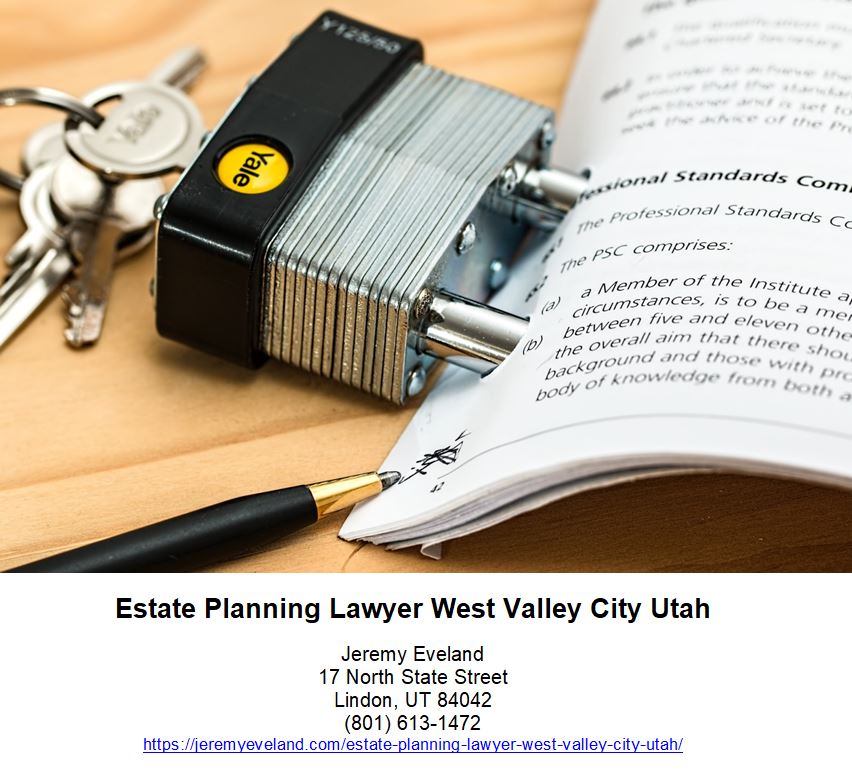-
Attorney at Law
- Introduction
- The Pros and Cons of Hiring an Estate Planning Lawyer in West Valley City
- What to Expect from an Estate Planning Lawyer in West Valley City
- The Benefits of Working with an Experienced Estate Planning Lawyer in West Valley City
- How to Choose the Right Estate Planning Lawyer in West Valley City
- Understanding the Basics of Estate Planning Law in West Valley City
- Q&A
“Secure Your Future with Estate Planning Lawyer West Valley City Utah”
Introduction
Welcome to Estate Planning Lawyer West Valley City Utah. We are a team of experienced attorneys dedicated to helping individuals and families in the West Valley City area with their estate planning needs. Our attorneys have extensive experience in estate planning, probate, trust administration, and other related areas of law. We understand the importance of protecting your assets and providing for your loved ones. We strive to provide our clients with the highest quality legal services and advice. Our goal is to ensure that your estate plan is tailored to your individual needs and goals. We look forward to helping you with all of your estate planning needs.
The Pros and Cons of Hiring an Estate Planning Lawyer in West Valley City
Hiring an estate planning lawyer in West Valley City can be a great way to ensure that your estate is managed properly and that your wishes are carried out after you pass away. However, there are both pros and cons to consider before making this decision.
Pros
1. Expertise: An estate planning lawyer in West Valley City will have the expertise and experience to help you create a comprehensive estate plan that meets your needs. They will be able to provide advice on the best way to structure your estate and ensure that your wishes are carried out.
2. Peace of Mind: Knowing that your estate is in the hands of a professional can provide peace of mind. An estate planning lawyer will be able to ensure that all of the necessary documents are in place and that your wishes are followed.
3. Cost Savings: Hiring an estate planning lawyer can save you money in the long run. They can help you avoid costly mistakes and ensure that your estate is managed properly.
Cons
1. Cost: Hiring an estate planning lawyer can be expensive. Depending on the complexity of your estate, the cost can be significant.
2. Time: Estate planning can be a lengthy process. An estate planning lawyer will need to review your assets and create a plan that meets your needs. This can take time and may require multiple meetings.
3. Complexity: Estate planning can be complex and confusing. An estate planning lawyer can help you understand the process and ensure that your wishes are carried out.
Overall, hiring an estate planning lawyer in West Valley City can be a great way to ensure that your estate is managed properly and that your wishes are carried out after you pass away. However, it is important to consider the pros and cons before making this decision.
What to Expect from an Estate Planning Lawyer in West Valley City
When you are looking for an estate planning lawyer in West Valley City, you can expect to receive professional and knowledgeable advice. An estate planning lawyer will help you create a plan that will protect your assets and provide for your family after you pass away.
The first step in working with an estate planning lawyer is to discuss your goals and objectives. Your lawyer will help you understand the different types of estate planning tools available, such as wills, trusts, and powers of attorney. They will also explain the tax implications of each option and help you decide which is best for your situation.
Your estate planning lawyer will also help you create a plan that will ensure your assets are distributed according to your wishes. This includes creating a will that outlines who will receive your assets and how they will be distributed. Your lawyer will also help you create a trust that will protect your assets from creditors and provide for your family after you pass away.
Your estate planning lawyer will also help you create a plan to manage your assets while you are alive. This includes creating a power of attorney that will allow someone to manage your finances and make decisions on your behalf if you become incapacitated. Your lawyer will also help you create a living will that outlines your wishes for medical care if you become unable to make decisions for yourself.
Finally, your estate planning lawyer will help you create a plan to minimize taxes and maximize the value of your estate. They will help you understand the different tax laws and how they apply to your situation. They will also help you create a plan to minimize taxes and maximize the value of your estate.
An estate planning lawyer in West Valley City can provide you with the professional advice and guidance you need to create a plan that will protect your assets and provide for your family after you pass away. They will help you understand the different estate planning tools available and create a plan that meets your goals and objectives.
The Benefits of Working with an Experienced Estate Planning Lawyer in West Valley City
When it comes to estate planning, it is important to work with an experienced lawyer who can help you make the best decisions for your future. An experienced estate planning lawyer in West Valley City can provide you with the guidance and advice you need to ensure that your estate is managed properly and that your wishes are carried out. Here are some of the benefits of working with an experienced estate planning lawyer in West Valley City.
1. Comprehensive Knowledge: An experienced estate planning lawyer in West Valley City will have a comprehensive knowledge of the laws and regulations that govern estate planning in the state of Utah. This knowledge will enable them to provide you with the best advice and guidance when it comes to making decisions about your estate.
2. Personalized Advice: An experienced estate planning lawyer in West Valley City will be able to provide you with personalized advice that is tailored to your specific needs and goals. They will be able to provide you with advice on how to best manage your estate and ensure that your wishes are carried out.
3. Expertise: An experienced estate planning lawyer in West Valley City will have the expertise to help you navigate the complex legal process of estate planning. They will be able to provide you with the guidance and advice you need to ensure that your estate is managed properly and that your wishes are carried out.
4. Peace of Mind: Working with an experienced estate planning lawyer in West Valley City will give you peace of mind knowing that your estate is in good hands. They will be able to provide you with the guidance and advice you need to ensure that your estate is managed properly and that your wishes are carried out.
When it comes to estate planning, it is important to work with an experienced lawyer who can help you make the best decisions for your future. An experienced estate planning lawyer in West Valley City can provide you with the guidance and advice you need to ensure that your estate is managed properly and that your wishes are carried out. With their comprehensive knowledge, personalized advice, and expertise, an experienced estate planning lawyer in West Valley City can help you make the best decisions for your future.
How to Choose the Right Estate Planning Lawyer in West Valley City
Choosing the right estate planning lawyer in West Valley City is an important decision. It is important to find an attorney who is knowledgeable and experienced in estate planning and who can provide the best advice and guidance for your particular situation. Here are some tips to help you find the right estate planning lawyer for you:
1. Research: Before you begin your search for an estate planning lawyer, it is important to do some research. Look for attorneys who specialize in estate planning and have experience in the West Valley City area. Check out their websites and read reviews from past clients to get an idea of their level of expertise.
2. Ask for Referrals: Ask family, friends, and colleagues for referrals to estate planning lawyers they have used in the past. This can be a great way to find an attorney who is knowledgeable and experienced in the area of estate planning.
3. Schedule a Consultation: Once you have narrowed down your list of potential attorneys, it is important to schedule a consultation with each one. During the consultation, ask questions about their experience, fees, and services. This will help you determine which attorney is the best fit for your needs.
4. Check Credentials: Make sure the estate planning lawyer you choose is licensed and in good standing with the state bar. You can check the lawyer’s credentials online or by contacting the state bar association.
5. Get Everything in Writing: Before you hire an estate planning lawyer, make sure you get everything in writing. This includes the attorney’s fees, services, and any other agreements you make.
By following these tips, you can be sure to find the right estate planning lawyer in West Valley City for your needs. With the right attorney, you can be sure that your estate planning needs are taken care of properly.
Understanding the Basics of Estate Planning Law in West Valley City
Estate planning is an important part of financial planning for individuals and families in West Valley City. Estate planning involves the preparation of documents that provide for the orderly transfer of assets upon death. It also includes the management of assets during life, and the protection of assets from creditors and taxes.
The primary goal of estate planning is to ensure that the wishes of the deceased are carried out in accordance with their wishes. Estate planning also helps to minimize taxes and other expenses associated with the transfer of assets.
The first step in estate planning is to create a will. A will is a legal document that outlines the wishes of the deceased regarding the distribution of their assets. It is important to ensure that the will is properly drafted and executed in accordance with the laws of the state of Utah.
The next step in estate planning is to create a trust. A trust is a legal entity that holds assets for the benefit of the beneficiaries. Trusts can be used to protect assets from creditors and taxes, and to provide for the orderly transfer of assets upon death.
The third step in estate planning is to create a power of attorney. A power of attorney is a legal document that allows an individual to appoint another person to act on their behalf in the event of their death or incapacity.
Finally, it is important to create a health care directive. A health care directive is a legal document that outlines the wishes of the deceased regarding medical care and end-of-life decisions.
Estate planning is an important part of financial planning for individuals and families in West Valley City. It is important to ensure that the wishes of the deceased are carried out in accordance with their wishes, and that assets are protected from creditors and taxes. It is also important to create a will, trust, power of attorney, and health care directive to ensure that the wishes of the deceased are carried out.
Q&A
1. What services does an estate planning lawyer in West Valley City, Utah provide?
An estate planning lawyer in West Valley City, Utah can provide a variety of services, including drafting wills, trusts, and other estate planning documents; advising on tax planning; and helping to manage and distribute assets. They can also provide guidance on probate and estate administration.
2. What should I look for when choosing an estate planning lawyer in West Valley City, Utah?
When choosing an estate planning lawyer in West Valley City, Utah, it is important to look for someone who is experienced and knowledgeable in the area of estate planning. You should also look for someone who is willing to take the time to understand your individual needs and goals.
3. How much does an estate planning lawyer in West Valley City, Utah cost?
The cost of an estate planning lawyer in West Valley City, Utah will vary depending on the complexity of the estate plan and the services provided. Generally, estate planning lawyers charge an hourly rate or a flat fee for their services.
4. What documents should I bring to my initial consultation with an estate planning lawyer in West Valley City, Utah?
When meeting with an estate planning lawyer in West Valley City, Utah, it is important to bring any relevant documents, such as a copy of your will, trust documents, and any other estate planning documents. You should also bring a list of questions and any other information that you think may be relevant.
5. What is the best way to find an estate planning lawyer in West Valley City, Utah?
The best way to find an estate planning lawyer in West Valley City, Utah is to ask for referrals from friends, family, or colleagues who have used an estate planning lawyer in the past. You can also search online for local estate planning lawyers and read reviews to get an idea of their experience and expertise.
Estate Planning Lawyer West Valley City Utah Consultation
When you need help from an Estate Planning Lawyer in West Valley City Utah call Jeremy D. Eveland, MBA, JD (801) 613-1472 for a consultation.
Jeremy Eveland
17 North State Street
Lindon UT 84042
(801) 613-1472
Related Posts
Concrete Pumping Business Lawyer
Do I Need A Board of Directors?
Estate Planning Lawyer West Valley City Utah
[geocentric_weather id=”1bc8dc63-43b8-4e54-9f84-b2eed30c81bd”]
[geocentric_about id=”1bc8dc63-43b8-4e54-9f84-b2eed30c81bd”]
[geocentric_neighborhoods id=”1bc8dc63-43b8-4e54-9f84-b2eed30c81bd”]
[geocentric_thingstodo id=”1bc8dc63-43b8-4e54-9f84-b2eed30c81bd”]
[geocentric_busstops id=”1bc8dc63-43b8-4e54-9f84-b2eed30c81bd”]
[geocentric_mapembed id=”1bc8dc63-43b8-4e54-9f84-b2eed30c81bd”]
[geocentric_drivingdirections id=”1bc8dc63-43b8-4e54-9f84-b2eed30c81bd”]
[geocentric_reviews id=”1bc8dc63-43b8-4e54-9f84-b2eed30c81bd”]



















